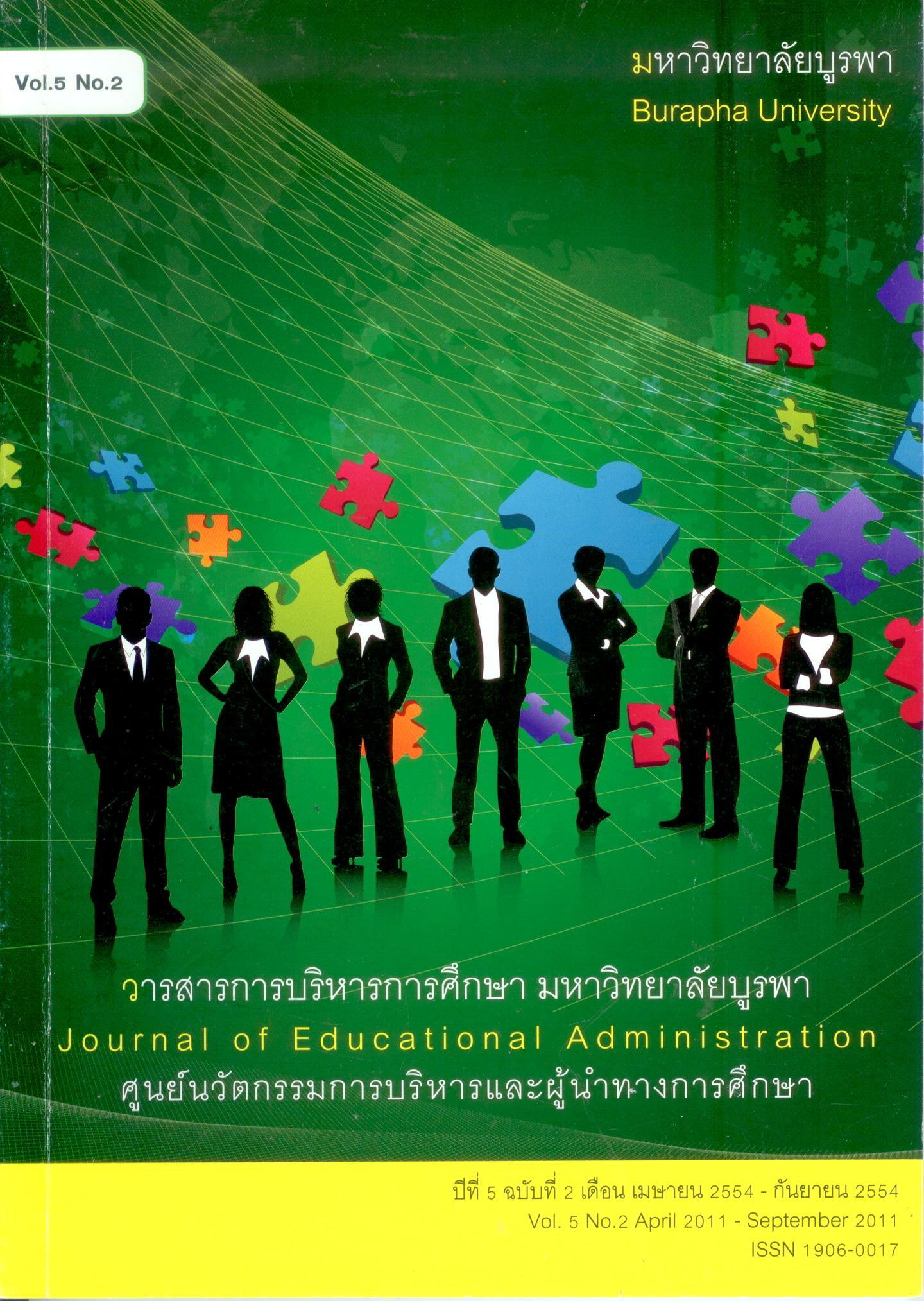การวิจัยเชิงปฏิบัติการแบบมีส่วนร่วมเพื่อพัฒนารูปแบบ การอนุรักษ์พลังงาน: กรณีศึกษาโรงเรียนเบญจมราชูทิศ จังหวัดจันทบุรี (A participatory action research for energy conservation model: a case study of benchamarachutis school chanthaburi province)
บทคัดย่อ
บทคัดย่อ
การวิจัยนี้มีวัตถุประสงค์เพื่อพัฒนารูปแบบการอนุรักษ์พลังงานในโรงเรียนเบญจมราชูทิศ จังหวัดจันทบุรี และเพื่อประเมินประสิทธิภาพของรูปแบบการอนุรักษ์พลังงานในโรงเรียน โดยใช้ เทคนิคการวิจัยเชิงปฏิบัติการแบบมีส่วนร่วม (Participatory Action Research: PAR) ตามแนวคิดของ เคมมิสและเมคเทกการ์ท (Kemmis & McTaggart, 1988) บูรณาการกับแนวคิดของซูเบอร์และสเคอร์ริท (Zuber & Skerritt, 1992) กระบวนการวิจัยมี 5 ขั้นตอนคือ 1) เตรียมการวิจัย 2) วิเคราะห์สภาพปัญหาและความต้องการ 3) วางแผนพัฒนา 4) นำแผนไปสู่การปฏิบัติ 5) ประเมินผลและปรับปรุงพัฒนา โดยกลุ่มผู้ให้ข้อมูลหลัก ที่มาจากผู้แทนจากผู้มีส่วนได้ส่วนเสียของโรงเรียน ประกอบด้วยฝ่ายบริหาร 1 คน ครูกลุ่มสารุการเรียนรู้กลุ่มสาระละ 1 คน รวม 8 คน หัวหน้าระดับชั้นชั้นละ 1 คน รวม 6 คน ผู้แทนผู้ปกครอง 6 คน ผู้แทนนักเรียน 6 คน คนขับรถ 1 คน นักการภารโรง 2 คน รวมทั้งหมด 30 คน สนามการวิจัยคือ โรงเรียนเบญจมราชูทิศ จังหวัดจันทบุรี การเก็บรวบรวมข้อมูลใช้วิธีการวิเคราะห์เอกสาร การสัมภาษณ์เชิงลึก การสังเกต การใช้เทคนิคพลังสร้างสรรค์และการระดมสมอง ผลการวิจัยพบว่ารูปแบบการอนุรักษ์พลังงานที่มีประสิทธิผลในโรงเรียนเบญจมราชูทิศ จังหวัดจันทบุรีประกอบด้วย 1) การสร้างทีมงานการมีส่วนร่วม 2) การศึกษาความต้องการจำเป็น 3) การร่างโครงการ/กิจกรรมการอนุรักษ์พลังงาน ซึ่งกิจกรรมการอนุรักษ์พลังงานประกอบด้วย การมีส่วนร่วมในการดำเนินการอนุรักษ์พลังงานในโรงเรียน การบูรณาการสอดแทรก การประหยัดพลังงานในบทเรียน และการจัดกิจกรรมเสริมหลักสูตรเกี่ยวกับการประหยัดพลังงาน 4) การทดลองใช้และการปรับปรุงโครงการ/กิจกรรม PAOR ประสิทธิภาพของรูปแบบ การอนุรักษ์พลังงานในโรงเรียน พบว่า ผลการดำเนินงานทำให้ค่าใช้จ่ายด้านสาธารณูปโภคลดลง เมื่อเปรียบเทียบกับก่อนดำเนินการ บุคลากรในโรงเรียนปรับเปลี่ยนพฤติกรรมการใช้พลังงานไปในทางที่ดีขึ้น คือ มีความตระหนักความรับผิดชอบ มีการเรียนรู้ร่วมกัน เสียสละ มั่นใจในตนเอง ริเริ่มสร้างสรรค์ กล้าแสดงออก มีภาวะผู้นำ ผู้ตามและมีความพึงพอใจต่อกิจกรรมการอนุรักษ์พลังงาน โดยทุกกระบวนการเกิดจากการมีส่วนร่วมของผู้ที่เกี่ยวข้องส่งผลให้การอนุรักษ์พลังงานในโรงเรียนมีความต่อเนื่องและยั่งยืน
ABSTRACT
The purposes of this research were to develop the Model of Energy Conservation in Benchamarachutis School and to assess the effectiveness of using the Model of Energy Conservation in school. The technique used in this research was Participatory Action Research which was integrated from Kemmis & McTaggart (1988) and Zuber - Skerritt (1992). The research processes were research preparation, need assessment, problem analysis, activities planning, testing and evaluating. The key performance respondents, selected from school stakeholders, were 1 administrator, 8 teachers from each subject study, 6 head teachers from each level of study, 6 parents and 6 pupils from each level of study, 1 driver and 2 janitors, totaled 30 peoples selected from people around Benchamarachutis School. Data collected by using document analyzing, intensive interviewing, observing brainstorming and appreciation influence control.
The result of study revealed that; model of energy conservation in Benchamarachutis School was consisted of 1) the building of participative team work 2) the performing of need assessment study 3) energy conservation projects/ activities sketching which the main conservation activities comprising participation of every school member in energy conservation and integrating energy conservation in teaching - learning activities compliance with special activities supplement 4) practice of PAOR process in projects/ activities application and improvement. The finding also revealed that the effectivenesses of energy conservation model were the reduction of payment in public utility and the improvement of conserving energy behaviors in self realization, self responsibility, share value, sacrificing, self confidence, self initiated, well expression, leadership and follower, as well as satisfaction in the activities toward energy conservation. All the processes derived from participation of stakeholders which affected people to continue conserving energy sustainably.


